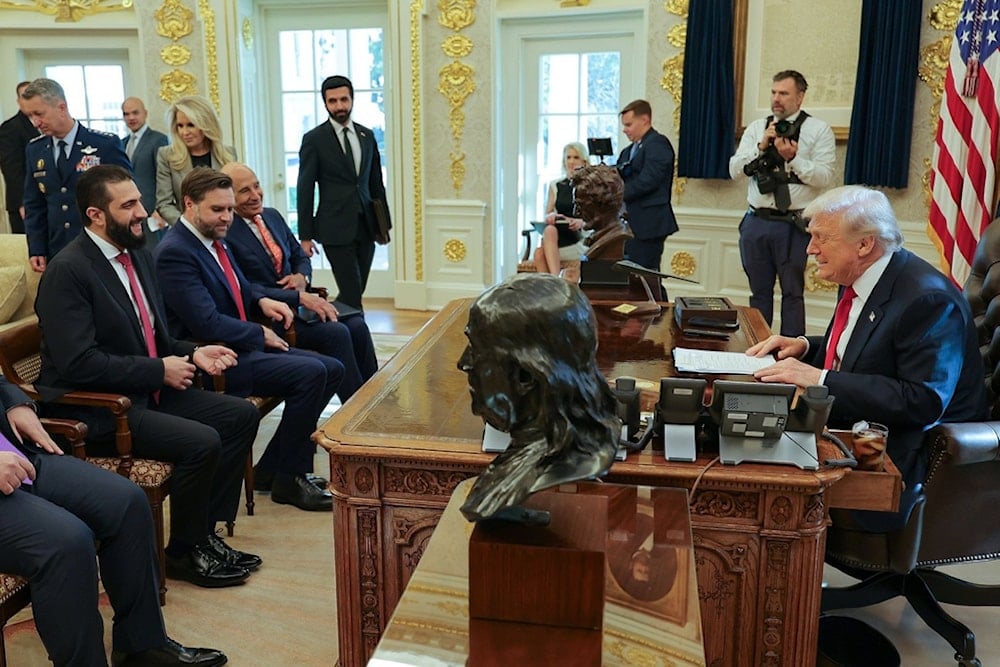Tom Barrack urges full repeal of Caesar Act to 'give Syria a chance'
The US Envoy to the Middle East says Syria "will now actively assist us in confronting and dismantling the remnants of ISIS, the IRGC, Hamas, Hizballah, and other terrorist networks."
-

US President Donald Trump meets with Syria's interim President Ahmad al-Sharaa at the White House in Washington, Monday, Nov. 10, 2025 (AP)
Congress must move to fully repeal the Caesar Act, said US Special Envoy for Syria Thomas Barrack, framing it as the “next step in truly giving Syria a chance,” as he praised what he described as a sweeping shift in regional dynamics driven by renewed engagement between Washington and Damascus.
Statement by Ambassador Thomas J. Barrack, Jr.
— Ambassador Tom Barrack (@USAMBTurkiye) November 13, 2025
On the Historic Visit of Syrian President Ahmed al-Sharaa to the White House
This week marks a decisive turning point in the modern history of the Middle East - and in the remarkable transformation of Syria from isolation to…
In a detailed post on X, Barrack urged lawmakers to take the “historic step” needed to help Damascus “restart its economic engine” and allow Syrians “not only to survive but to thrive.”
His comments followed US President Donald Trump’s May 13 declaration that he would lift all US sanctions on Damascus to give Syria and its people a genuine chance at renewal, a decision that Barrack portrayed as central to reshaping Syria’s political and economic trajectory after years of isolation.
The US envoy said he had the “profound honor” of accompanying Interim President Ahmad al-Sharaa during his recent White House visit, describing the meeting as a symbol of Syria’s transformation “from isolation to partnership.”
He noted that discussions between Trump and al-Sharaa were “warm and substantive” and rooted in a shared belief that “the time has come to replace estrangement with engagement,” with both sides reaffirming commitments to rebuild relations and pursue wider regional cooperation.
Former HTS chief pledges to fight ISIS
According to Barrack, al-Sharaa used the Oval Office meeting, attended by Vice President JD Vance, Secretary of State Marco Rubio, Defense Secretary Pete Hegseth, and other senior officials, to formally commit Syria to the US-led coalition to allegedly fight terrorism.
He characterized the move as “a historic framework,” signaling Syria’s shift “from a source of terrorism to a counterterrorism partner." He highlighted Damascus’ pledge to “actively assist” the US in "confronting and dismantling the remnants of ISIS, the IRGC, Hamas, Hizballah, and other terrorist networks," vowing that Damascus "and will stand as a committed partner in the global effort to secure peace."
This comes after Syria announced on November 10 that it had signed a political cooperation declaration with the International Coalition to Defeat ISIS.
On November 7, the United States formally removed Syrian President Ahmad al-Sharaa from a terrorism blacklist, just three days before his visit to Washington. The move also came a day after Washington led a vote by the Security Council to remove UN sanctions on the Syrian interim president.
Al-Sharaa, with the nom de guerre of Abou Mohammad al-Joulani, was the leader of Hay'at Tahrir al-Sham (HTS) in Syria, a group that emerged from factions previously affiliated with al-Qaeda.
Turning adversaries into partners
Barrack linked the decision to a broader diplomatic reshaping underway across the region. He pointed to a follow-up trilateral meeting involving Rubio, Turkish Foreign Minister Hakan Fidan, and Syrian Foreign Minister Asaad al-Shaibani, during which officials discussed integrating the Syrian Democratic Forces (SDF) into Syria’s political and security structures, redefining Turkish-Syrian-Israeli relations, and advancing frameworks tied to the ongoing ceasefire in Gaza and Lebanon border negotiations.
He also praised Türkiye’s “tireless role” in regional mediation, calling it “a testament to the quiet, steadfast diplomacy that builds bridges where walls once stood,” and credited Ankara, along with Qatar and Saudi Arabia, for supporting “the resurgence of a Syrian nation state for the entire region.”
Barrack concluded by describing the overall US approach as one rooted in “security first, prosperity next,” arguing that Trump’s leadership is enabling former adversaries to become partners “through regional initiative rather than Western mandates.”

 4 Min Read
4 Min Read










